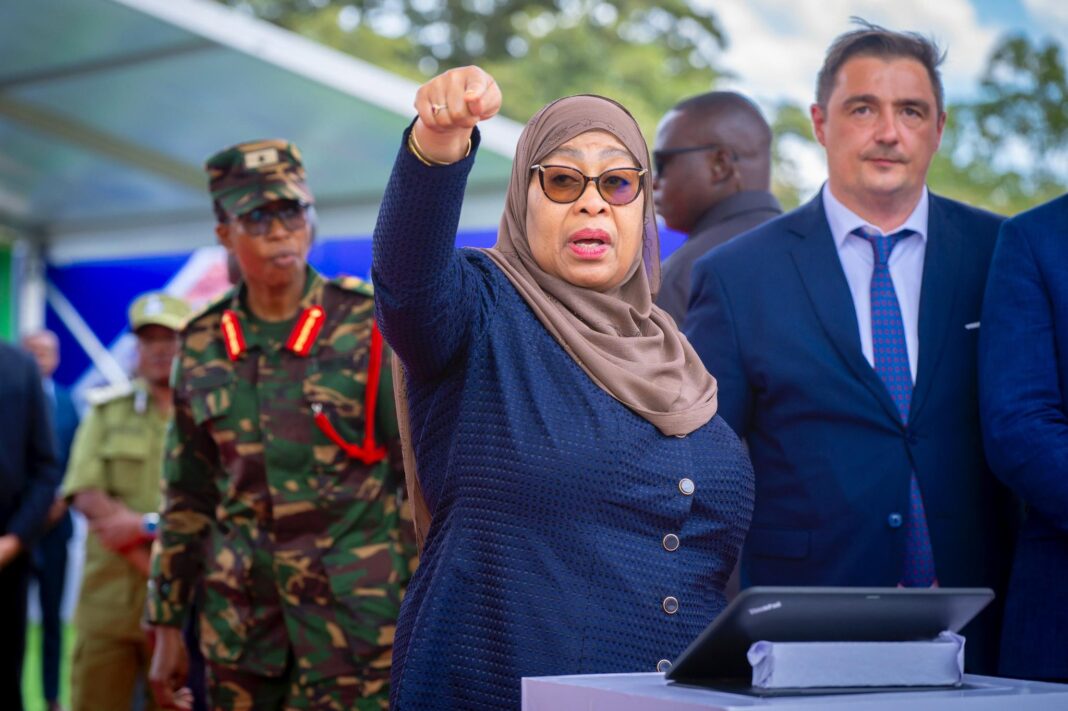DAR ES SALAAM, Tanzania – President Samia Suluhu Hassan’s controversial decision to ban foreigners from 15 small business sectors has earned widespread acclaim from Tanzanian traders and entrepreneurs, even as it draws sharp criticism from regional partners and threatens to upend East African integration efforts.
The Business Licensing Order, implemented on July 28, has been hailed by local business communities as a long-overdue measure to protect domestic economic opportunities for Tanzania’s nearly 60 million citizens.
The policy came just as news was emerging that in the new Finance Act, Tanzania was imposing unpopular tariffs on regional goods, signaling a broader shift toward economic nationalism ahead of October’s general elections.
Local Traders Welcome Protection
Tanzanian businesses welcomed the directive, particularly in markets like Kariokor in Dar es Salaam, which attracts many foreign nationals, including Kenyans, Zambians and Chinese.
The new regulations bar non-citizens from obtaining licenses in sectors including retail trade, hairdressing, small-scale mining, tour guiding, mobile money transfers, and salon services.
Trade Minister Selemani Jafo defended the policies, saying the government was having “a bit of a challenge with foreign businesses, where people are involved in business activity that they should not be in the first place”.
He emphasized that some of these businesses were operating illegally, prompting President Suluhu’s directive for foreign exclusion.
The minister explained that “We formed a team of experts who examined and determined the various categories of businesses that they should engage in.
So, in the 2025/26 budget, the Minister for Trade was given clear instructions and the opportunity to streamline categories of businesses and determine which ones were prohibited”.
Election-Year Politics and Economic Nationalism

With general polls scheduled for October 2025, analysts say President Samia Suluhu Hassan’s ruling CCM party could be using the ban to shore up domestic support, tapping into economic anxieties and nationalist sentiment.
The timing appears strategic, as the Samia Suluhu Hassan administration, under pressure to provide economic opportunities to its nearly 60 million people – and with a general election on October 28 – is effectively excluding foreigners from the “Kadogo economy”.
This domestic political calculation appears to be paying dividends.
Unlike the sharp criticism emanating from Kenya and other East African Community partners, the policy has been received positively within Tanzania, where local traders view it as protecting their livelihoods from unfair foreign competition.
The policy is part of a broader government strategy to promote citizen-led growth, expand economic opportunities for Tanzanians, and reshape the structure of local business ownership, according to a dispatch from the Tanzanian Ministry of Trade and Industry.
The government has also introduced an industrial development levy in the Finance Act 2025, targeting imported goods including beer, wine, energy drinks, and other products from EAC partners.
This fiscal policy is contrary to the EAC Customs Union requirements, which requires goods originating from the region be exempted from duty.
Regional Tensions Mount
The policy has sparked a diplomatic crisis within the East African Community.
Kenya’s Trade Minister Lee Kinyanjui described the new measures as “discriminatory” and warned they would hurt both economies.
A meeting is scheduled in the coming days to address the matters arising from the policies, including “a Joint Trade Committee to review levies, fees and charges on August 11 and 12”.
EAC Secretary-General Veronica Nduva reminded partner states that “the Protocol explicitly emphasises that partner states shall not reverse or restrict sectors and trades they have previously liberalised” and that “unilateral backtracking on these commitments is inconsistent with the obligations under the Protocol”.
However, the partner states are notorious for not implementing secretariat decisions and the EAC’s call on Tanzania could as well fall on deaf ears, considering that the new policies have been received well locally and, this being an election year, President Samia, who is seeking a new term, may not bow to external pressure to the chagrin of her voters.
Economic Impact and Trade Statistics
The policy threatens significant economic relationships within the region. The EAC remains Kenya’s largest export market, accounting for 28.1 per cent of the country’s total exports, which are estimated to be worth $2.3 billion in 2024.
Tanzania is Kenya’s second-largest EAC trading partner after Uganda, with intra-community trade worth an estimated $486 in 2024.
The controversy highlights broader challenges facing regional integration.
According to EAC Legal Notice dated June 30, and national Finance Acts, 2,464 tariff lines have been adjusted in the new fiscal year through stays or remissions, eating into intra-EAC trade.
This is compared to 1,956 tariff lines under stay in 2024.
As President Suluhu navigates between domestic political pressures and regional diplomatic concerns, the success of her economic nationalism strategy will likely be measured at the ballot box in October.
For now, the policy appears to be achieving its intended domestic political effect, even as it raises questions about Tanzania’s commitment to regional integration and the future of the East African Community’s common market project.
The coming weeks will test whether diplomatic pressure from regional partners can convince Dodoma to modify its stance, or whether domestic political considerations will continue to take precedence over regional integration commitments.


